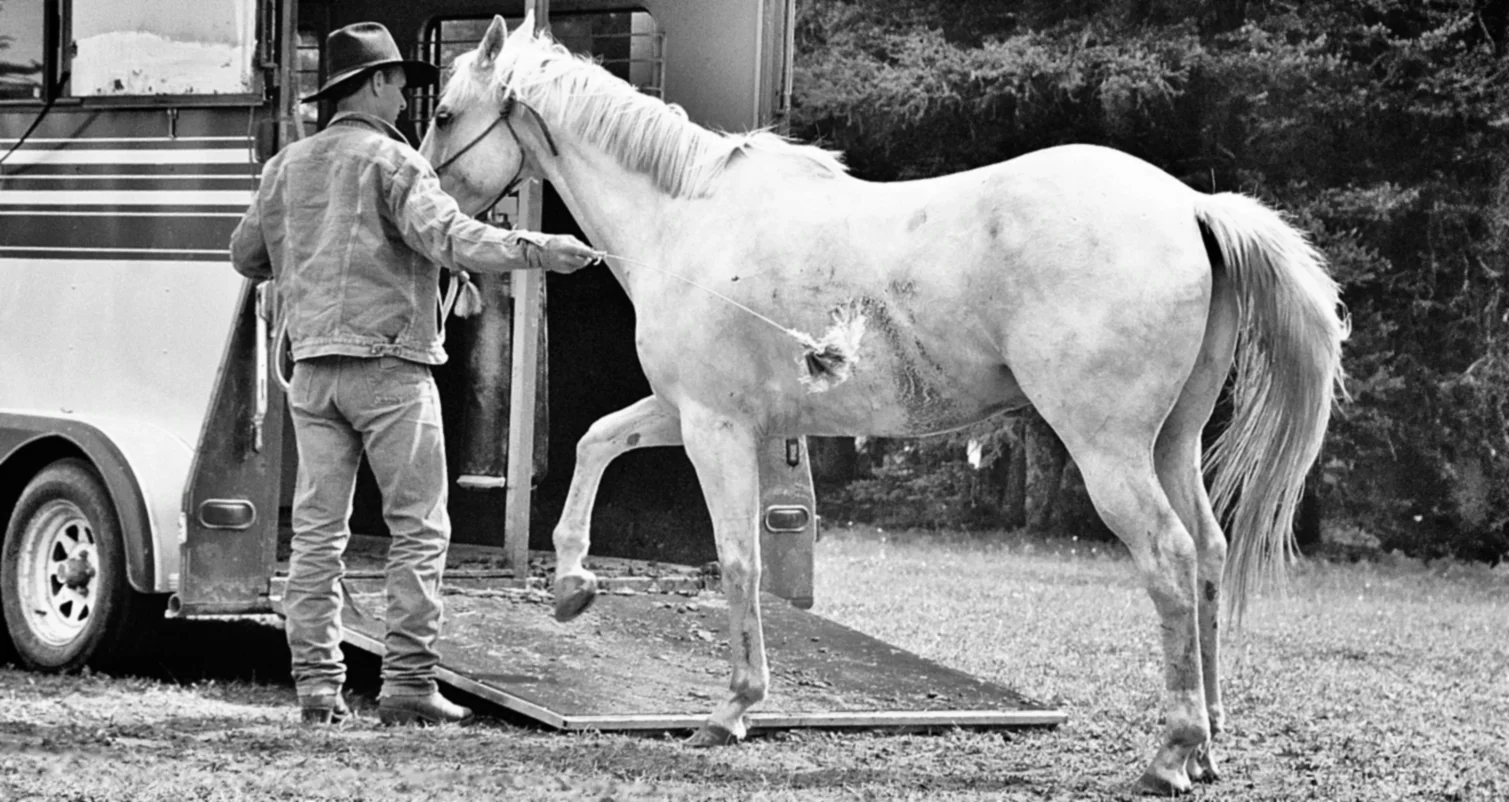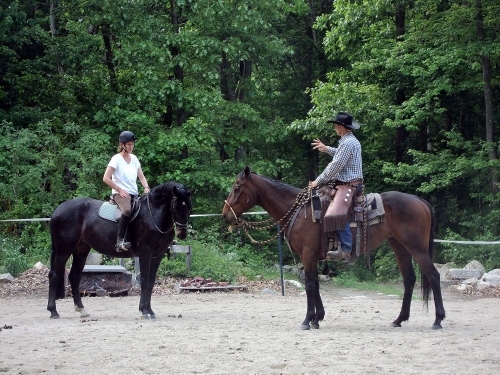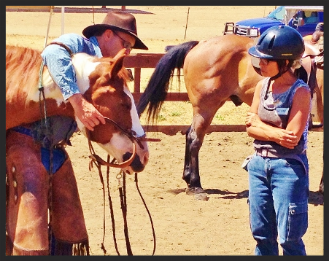About Chris' Clinics
(To sign up to ride in a clinic please go to his “schedule” page.)
Each of Chris’ clinics is built around learning to see what a horse sees. Riders are often surprised at how things appear from a horse’s perspective. Clinic participants will have the opportunity to develop a deeper level of two-way communication that can be taken in any direction. Understanding is the foundation of all true horsemanship and any discipline is welcome. Riders will go home with new insights and helpful exercises, whatever their chosen pursuit. Chris excels in getting to the root of the problem with troubled horses and at each clinic time is set aside for one-on-one guidance- an opportunity for all students to learn from each other. At the end of each day Chris, being something of a workaholic, will make himself available to talk horses for as long as anyone would like to stay.
Clinic Types
Chris Ellsworth Horsemanship currently offers many types of horsemanship clinics, cow working clinics and private clinics. Don't see exactly what you're looking for? Please contact us if you have something else in mind.
Horsemanship:
There are many paths to a great relationship with your horse and the trail to a solid foundation is unique to each of us. No one program or method is right for every rider or every horse. There is only an individual blend of principles and personalities. Our horsemanship clinics are all about finding the right mix for you.
I believe that regardless of the kind of saddle you use, what’s underneath it is still a horse so I try to present a program of logical, progressive steps that are designed to benefit the relationship between horse and rider no matter what style of riding you prefer. As such, my horsemanship clinics are open to all disciplines and all levels of riding.
I will be riding western, if you want to call it that, but I borrow from many types of riding and have no particular bias for or against any other style so long as it is fitting for the horse. This comes from a lifetime of working and riding on the northern ranges where settlement patterns and climate have created a penchant for doing what works as opposed to being bound to any particular tradition. And like the Northern Range, I’ve had a hodge-podge of influences, everything from Wyoming ranch hands to European Haute Ecole. What really matters to me is helping horses and their riders get along in this world.
How Horsemanship Clinics Work:
We’ll begin with some ground work; the horses are usually saddled but in the halter. This gives the horses time to settle in and to begin to function as a herd. Human participants get a chance to settle in as well, and it’s a good time to assess where everyone is at. From there we move on to riding. On most days we start at nine and take a break at noon. This gives our horses time to take on some water and eat a little bit. Same for us humans…
We resume at one o’clock, addressing any leftover issues and covering whatever new items are appropriate. Riders and auditors are encouraged to ask questions and raise topics throughout. Our afternoons usually last until four and most days will follow a similar pattern.
We limit the number of participants so everybody gets individual attention; 15 is usually the maximum but at some venues it is less due to the size of the arena. (We try to maintain adequate space for equine traffic control!) Prior to each clinic participants will receive an email with information regarding the venue, arrival times and stabling options etc. and you are always free to contact us ahead of time with any additional questions you may have.
What Areas Will Be Covered:
Because each horse/human relationship and each group of participants is unique, it’s almost impossible to say what will happen in any given clinic so, to put it simply, we will work on whatever comes up. The goal for all of our clinics is to foster real partnerships, partnerships which bring meaning to both horse and human and provides tools for continued growth. Therefore we will spend as much of our time as necessary working at the foundational level. This however, is far from rudimentary; a deep understanding of the basics is really the essence of true horsemanship. A person could dedicate a lifetime to working at this level and never run out of things to learn. I know I never tire of it!
Advancing your partnership comes means collaborating with your horse so each one of my clinics concerns itself with not only “fixing” our horses but with working on ourselves as well. Many times a relatively small adjustment in body position, approach, energy level or even demeanor can make a big difference in the level of communication we have with our horses. That’s the physical part of it for us. We will also be working on the mental part, which is learning to correctly and objectively observe a horse’s responses and reactions to all things, understanding why he would have such responses, and making thoughtful adjustments that will help him be the best partner he can be.
In this way, we can add exercises to increase precision, complexity and speed control (up or down) without adding confusion, tension and anticipation at the same time. While challenge does indeed create growth, as we add more layers to our work we must manage them carefully in order to foster that growth without creating trouble—especially for the horse. At one of our horsemanship clinics you will be doing exercises and challenges that are designed to “adjust the recipe” to fit you and your horse. And some of them might come in a form you may not expect!
HORSES HELPING HORSES***
Horses are their own best mentors. Learn how to incorporate this into your training and even how to make changes in your herd dynamics at home. In this clinic we’ll cover how to set a good horse example, proper angles, leading and working in close with another horse, how to encourage lightness in the bridle from the back of another horse, using a broke horse to help start colts, safety for you and your horse, coordination between reins and lead
I am really excited to work HHH into my clinic schedule this year. I’ve wanted to do this for a long time because I believe it is the most natural form of equine education. Working this way is extremely beneficial for both the mentor horse and the student horse and it will go a long way in improving your own horsemanship too.
***ROUND PENNING THE RIGHT WAY***
Don’t miss this chance to learn how to really connect your liberty work to your work under saddle! Round pens are like power tools; used correctly they are a tremendous help, used incorrectly they can do a whole lot of damage. Unfortunately, there’s a great deal of misunderstanding surrounding the two outcomes. In this clinic you’ll see the difference. Some of the topics we’ll cover are body positioning, correct angles, reading and gauging responses, speed control, energy control, hooking on, discerning the real messages you may (inadvertently) be sending your horse and whatever else happens to come up during our session.
TWO DAY HORSEMANSHIP CLINIC
We will begin each morning session at 9:00 with groundwork. Many problems under saddle will actually show themselves on the ground and a good start towards handling them can be made here. Even in a relationship not fraught with fear, great strides towards improved communication and lightness can be made on the halter.
Typically the groundwork will take two hours or so the first session. This much time allows me to work with everyone, both as a group and individually. I will not let you get lost in the shuffle. This is also a time when we work on some of the foundational principles of a good horse-human relationship. Depending on available time we will then saddle up and go over some basics of good riding until a lunch break at noon. I am often available during this break to work with individuals or especially troubled horses.
At 1:00 we begin the afternoon session. This part is all riding (usually). We will connect what we've done on the ground to our riding and focus on any problems or troubles that may arise. I find that working together in this manner is extremely helpful; the humans can learn from not only what they are working on as individuals but also by watching each other, while the equines draw support from the other horses. This session usually ends by 4:00 but I am often available afterwards to work with individuals as needed for troubles such as trailer loading, foot handling and the like.
We begin the second day with a shorter session of groundwork as a warm up and then we move on to our riding. After lunch break we usually set up some sort of challenge course to put our horses into simulations of things they may someday face out in the real world. Afterwards, we spend time breaking down individual needs and everyone gets to work on something of their own choosing, provided of course, that I feel their horse is up to it. I will also spend a moment with each individual, microphone off, discussing what I see as their strengths and weaknesses, and maybe giving them a little homework assignment.
Clinics are limited to 15 riders per session so that I can give everyone the one-on-one time they deserve. Sometimes this necessitates splitting the riding into two sessions, the second group immediately following the first. Riders are encouraged to watch their counterparts. Auditors are welcome at all sessions* and are free to ask questions as well.
*price varies
ONE-ON-ONE CLINIC
This clinic is a series of one-on-one lessons with Chris. He will work individually with participants on the issue of their choice (Chris reserves the right to use his discretion if he feels a request would be unsafe/inappropriate for horse or rider). The rest of the time can be spent observing the other lessons. This is a great chance to watch Chris teach in a narrowly focused setting and quite often there are a wide variety of topics that come up over the course of the day. Onlookers are free to take part in the discussion and ask questions throughout the sessions.
COW WORKING
This is an excellent opportunity for someone whose horse has never been around a cow to get off to a good start. It's also a good place to start if you are a rider who has never been around cattle or hasn't worked cattle horseback very often.
We will begin by working on a few moves necessary to properly handle cattle and a little discussion of strategy and things that may possibly come up when working cattle. Then we'll bring out some bovines and get started, first by moving them as a group to build confidence in our horses and then we'll follow them individually in a process known as "tracking". Where we go from there will depend both on the horses and the cattle we are using but that's how it goes in the cow biz...
The second session will be aimed at getting our horses to control the cattle, both small bunches of them and for more of a challenge, lone individuals. Again this will depend on the horse and to some extent the cattle.
A few of the more advanced things we may work on include mirroring, sorting, holding herd, cutting one out and working it, putting cattle through gates,etc. The methods we will use are not designed to make your horse ready for the NCHA but rather to show how cattle can be handled in everyday ranch/range situations.
*These cow working clinics are designed to help your horse learn by doing; he does not need to be a highly finished horse to participate. We strive to maintain a calm learning environment but cattle (and horses) are not entirely predictable so you do need to have some basic control in order to keep yourself and others safe. If you are unsure whether your horse is ready for for a cow working clinic please feel free to contact me via email or phone and we can talk it over - I'm always happy to talk horse!
Private:
This is an option for certain outfits or businesses who would like to schedule a private clinic at their location for their members only. Working ranches, guest ranches and stables/equestrian centers can all benefit from this type of clinic. Please contact us to discuss options that will best meet the needs of your company.





